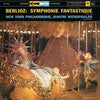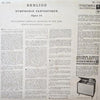



Berlioz - Symphonie Fantastique - Dimitri Mitropoulos
Hector Berlioz - Symphonie Fantastique Op.14
The New York Philharmonic Orchestra
Dimitri Mitropoulos - Conductor
1 LP, standard sleeve
Original analog Master tape : YES
Heavy Press : 180g
Record color : black
Speed : 33 RPM
Size : 12'’
Stereo
Record Press : Pallas GmbH in Germany
Label : Speakers Corner
Original Label : Columbia
Recorded February 1957 in New York City
Mastered by Kevin Gray
Originally released in 1957
Reissued in 2017
Tracks:
Side A :
I - Reveries; Passions
II - Un Bal
Side B :
III - Scéne Aux Champs
IV - Marche Au Supplice
V Songe D'Une Nuit Du Sabbat
Reviews :
« Berlioz’s Symphonie Fantastique seems to bring out the best in performers and there are a large number of recommendable versions ranging from Pierre Monteux in 1930 to John Elliott Gardiner in 1990, of which this 1957 Mitropoulos version, from the early days of stereo, is an interesting example. The Symphony starts with a long Largo introduction, whose idée fixe acts as a leitmotif, here Mitropoulos moves forward without ever rushing and the use of antiphonal violins adds to the sense of dialogue between the instruments. In the main Allegro agitato e appassionato assai, Mitropoulos sees structure (it is in sonata-form) as opposed to episode, which means the fugato elements are given due weight and power and in the recapitulation the race to the quiet codetta is immensely exciting. Nor does he hang around in Un bal - which is effectively a scherzo – although he doesn’t quite swing and shape the rhythms in the way Martinon and Barbirolli (live with the Halle in 1967) do. The woodwind solos at the start of Scène aux champs are lacking in atmosphere, but the wonderful passage where the cor anglais intones the movements opening theme accompanied by four timpani depicting distant thunder, is beautifully realised.
Mitropoulos’s very straight approach to the Marche au supplice lacks the concentrated power of Martinon, or hell-for-leather excitement of Munch (Boston Symphony Orchestra) but again this fits in with his desire to emphasis form. Very much the same happens in the Songe d'une nuit du sabbat where the bells toll beautifully and there are no unwritten huge tempo changes, but a touch more devilry and flamboyance wouldn’t have gone amiss. » Classical sources
Ratings :
Discogs : 4.57 / 5 , Classical sources : Sound Balance: 4 Inner balance: 3 Detail and clarity: 3 Dynamic range: 2


